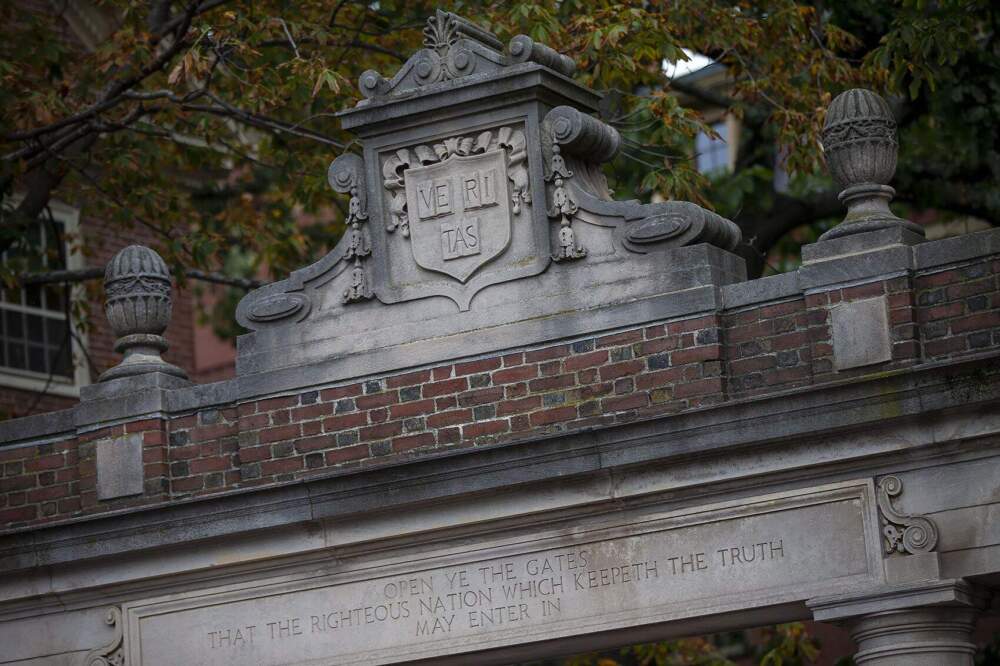Advertisement
Harvard's troubles are 'self-inflicted,' says crisis management consultant

Harvard University is in the midst of a major crisis. It's looking for a new president, after Claudine Gay stepped down Tuesday. She took the position six months ago.
Gay's resignation comes after she was sharply criticized for her public response to the war between Hamas and Israel and the resulting tensions on campus. Adding to the pressure were accusations that she committed plagiarism in her early academic writing.
WBUR's All Things Considered host Lisa Mullins spoke with Simon Barker, managing partner of Blue Moon Consulting Group in Denver, Colorado. The firm consults colleges and universities on how to prevent and respond to crises.
Barker said he thinks Harvard is in a very difficult position that is largely "self-inflicted." The university's first misstep, according to Barker, came with Gay's initial statement two days after the Oct. 7 Hamas attacks on Israel. In the statement, Gay did not firmly condemn the attacks or respond to concerns on campus about some student groups having blamed Israel.
Interview Highlights
On Harvard's public response to the Hamas attack and fallout on campus:
"The initial communication was poor and was slow. ... Their credibility was subsequently undermined — not just Harvard, but [other universities] — by the need to restate, recalibrate, reissue [statements] multiple times.
"And unfortunately, when any president decides they are kind of going to interpret the world around them and that is an important part of their role, they will get into these types of troubles. And an issue as polarized and challenging as Israel and Hamas is one where they should have ... gone in eyes wide open as to what they were going to be opening in terms of criticism."
On Gay going before a congressional panel, along with the presidents of MIT and University of Pennsylvania, to answer questions about anti-Semitism on their campuses:
"It was absolutely clear that [the inquiry] was politically intended. And whether or not they felt there was an option to not engage in what would always be political theater was a decision that I think they could have made. ...
"Columbia [University], for example, which had a lot of different issues on their campus ... declined the opportunity [to testify]. It was never going to be a favorable hearing. That said, [the presidents] did not prepare in a manner that was sufficient for the moment.
"I think in a lot of situations there is a tendency to focus on a narrow legalistic frame. And to rely on that legal frame, when we're dealing with fundamentally a reputational issue, tends to lead to poor results."
On Gay facing allegations of plagiarism in past academic writing:
"When a president is under the kind of scrutiny and criticism that she was, we have to recognize and anticipate that other unrelated issues are going to be brought to bear. ... Because it goes to the heart of academic integrity, that is why it's an important issue, whether these are egregious violations or not.
"It's unclear that the normal process was used [to review the allegations]. And I think where universities get into trouble is when they circumvent that and essentially fold to political pressure — which is essentially what they have done here."
On Harvard letting the crisis become part of the public domain, as opposed to trying to keep it internal:
"They were used, as other schools were, as exemplars of what certain political groups see as a woke, left-wing higher education environment.
"One of the key principles, we believe, of effective crisis management is to focus on key stakeholders first, by which I mean, 'Make sure our faculty understand our point of view, make sure our students understand our institutional [perspective] and make sure our alumni understand why we're doing what we're doing.' Too often, the response by a [university] president and the leadership is based on a reactive media response kind of dynamic."
On how Harvard will emerge from this crisis:
"Fundamentally, the [resignation] of the president hasn't changed any of the criticism about whether or not this is a sort of hostile place for Jewish students to work and survive and thrive in an academic environment. It hasn't fundamentally changed any of the conflicts that Harvard has, as other universities [have], between their First Amendment kind of obligations and creating a diverse, welcoming community. The [Harvard Corporation] are going to have to look about how this was handled, because there's no reason to think some other event couldn't happen on campus tomorrow that the university is going to have to respond to. And it's going to have to respond better than it did this time."
This segment aired on January 3, 2024.

